Social Contract Theory: Examining the Ethics of Helmet Law Compliance
VerifiedAdded on 2023/06/03
|7
|1726
|253
Essay
AI Summary
This essay delves into the social contract theory to examine the justification for helmet laws and the ethical implications of disregarding them. It begins by outlining the core tenets of social contract theory, emphasizing the role of government in providing security and the obligations of individuals within a governed society. The essay argues that governments are justified in imposing laws, such as helmet laws, for the common good and the safety of citizens. It further explores the extent to which individuals are obligated to obey governmental dictates, acknowledging exceptions when dictates are unreasonable or not aimed at the common good. By connecting traditional theories to contemporary society, the essay concludes that it is unethical for citizens to ignore helmet laws, as these laws are designed to protect individuals and reflect a broader social contract where citizens agree to abide by laws for the collective welfare. The document is available on Desklib, a platform offering a range of study tools and resources for students.
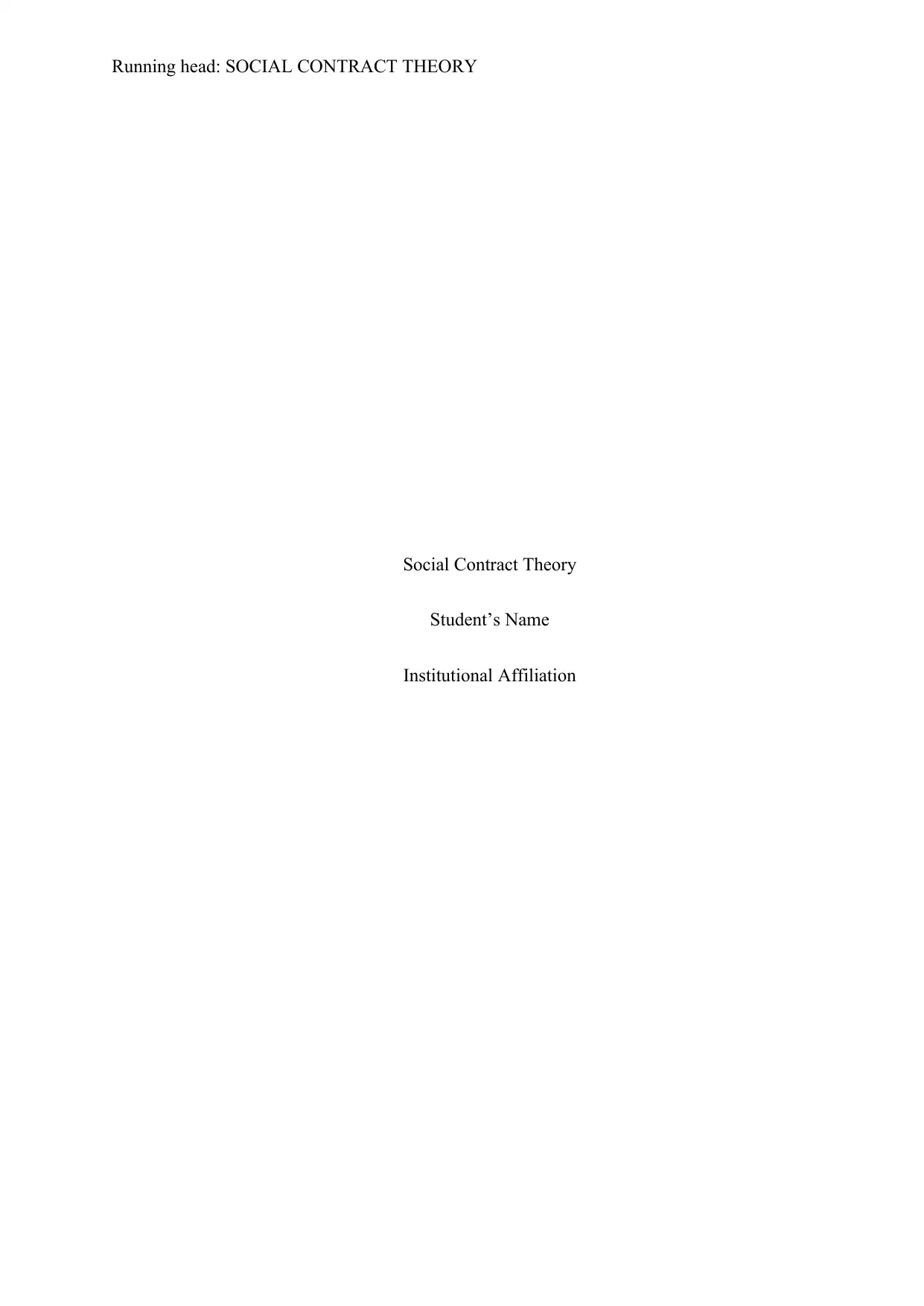
Running head: SOCIAL CONTRACT THEORY
Social Contract Theory
Student’s Name
Institutional Affiliation
Social Contract Theory
Student’s Name
Institutional Affiliation
Paraphrase This Document
Need a fresh take? Get an instant paraphrase of this document with our AI Paraphraser
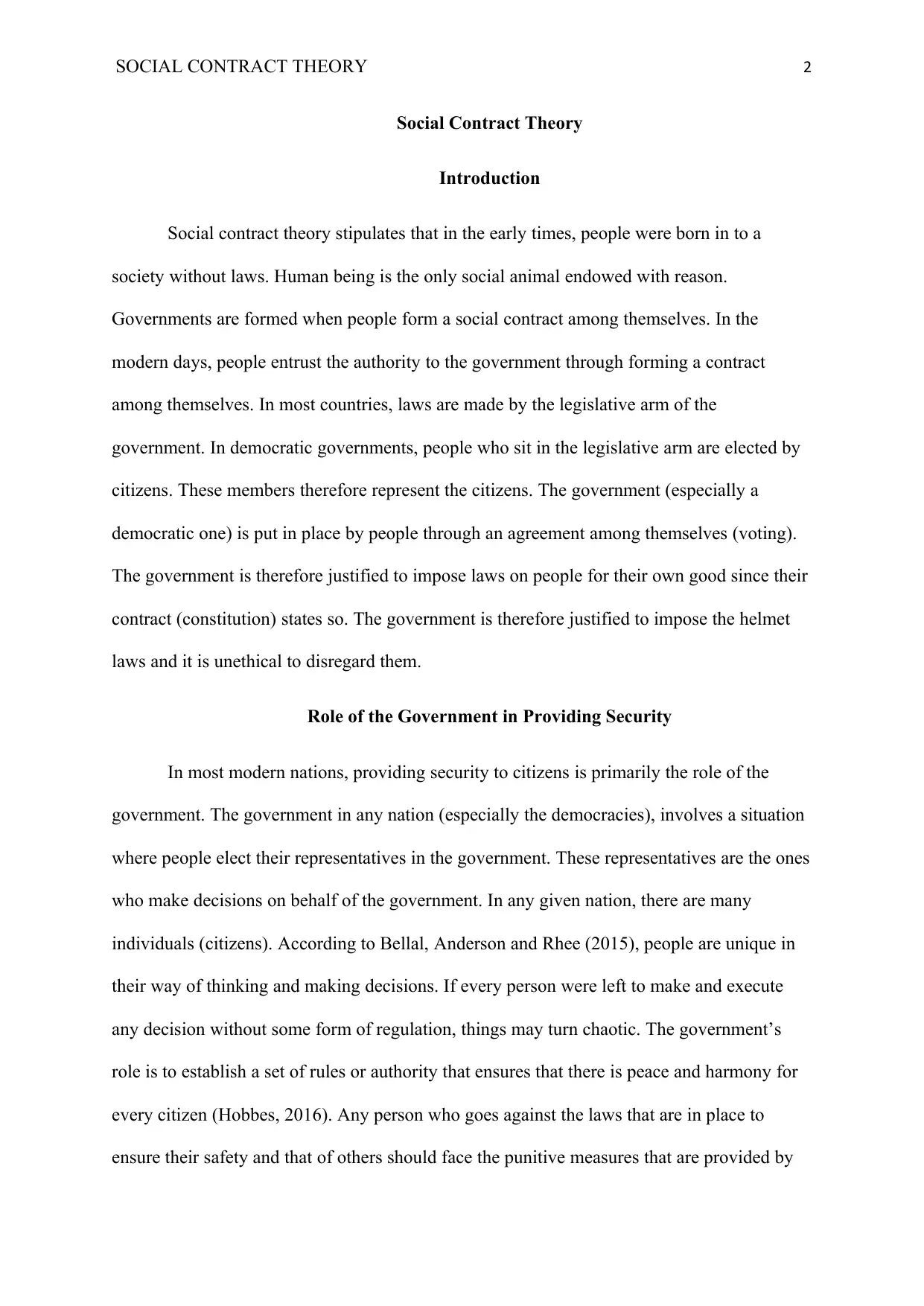
SOCIAL CONTRACT THEORY 2
Social Contract Theory
Introduction
Social contract theory stipulates that in the early times, people were born in to a
society without laws. Human being is the only social animal endowed with reason.
Governments are formed when people form a social contract among themselves. In the
modern days, people entrust the authority to the government through forming a contract
among themselves. In most countries, laws are made by the legislative arm of the
government. In democratic governments, people who sit in the legislative arm are elected by
citizens. These members therefore represent the citizens. The government (especially a
democratic one) is put in place by people through an agreement among themselves (voting).
The government is therefore justified to impose laws on people for their own good since their
contract (constitution) states so. The government is therefore justified to impose the helmet
laws and it is unethical to disregard them.
Role of the Government in Providing Security
In most modern nations, providing security to citizens is primarily the role of the
government. The government in any nation (especially the democracies), involves a situation
where people elect their representatives in the government. These representatives are the ones
who make decisions on behalf of the government. In any given nation, there are many
individuals (citizens). According to Bellal, Anderson and Rhee (2015), people are unique in
their way of thinking and making decisions. If every person were left to make and execute
any decision without some form of regulation, things may turn chaotic. The government’s
role is to establish a set of rules or authority that ensures that there is peace and harmony for
every citizen (Hobbes, 2016). Any person who goes against the laws that are in place to
ensure their safety and that of others should face the punitive measures that are provided by
Social Contract Theory
Introduction
Social contract theory stipulates that in the early times, people were born in to a
society without laws. Human being is the only social animal endowed with reason.
Governments are formed when people form a social contract among themselves. In the
modern days, people entrust the authority to the government through forming a contract
among themselves. In most countries, laws are made by the legislative arm of the
government. In democratic governments, people who sit in the legislative arm are elected by
citizens. These members therefore represent the citizens. The government (especially a
democratic one) is put in place by people through an agreement among themselves (voting).
The government is therefore justified to impose laws on people for their own good since their
contract (constitution) states so. The government is therefore justified to impose the helmet
laws and it is unethical to disregard them.
Role of the Government in Providing Security
In most modern nations, providing security to citizens is primarily the role of the
government. The government in any nation (especially the democracies), involves a situation
where people elect their representatives in the government. These representatives are the ones
who make decisions on behalf of the government. In any given nation, there are many
individuals (citizens). According to Bellal, Anderson and Rhee (2015), people are unique in
their way of thinking and making decisions. If every person were left to make and execute
any decision without some form of regulation, things may turn chaotic. The government’s
role is to establish a set of rules or authority that ensures that there is peace and harmony for
every citizen (Hobbes, 2016). Any person who goes against the laws that are in place to
ensure their safety and that of others should face the punitive measures that are provided by
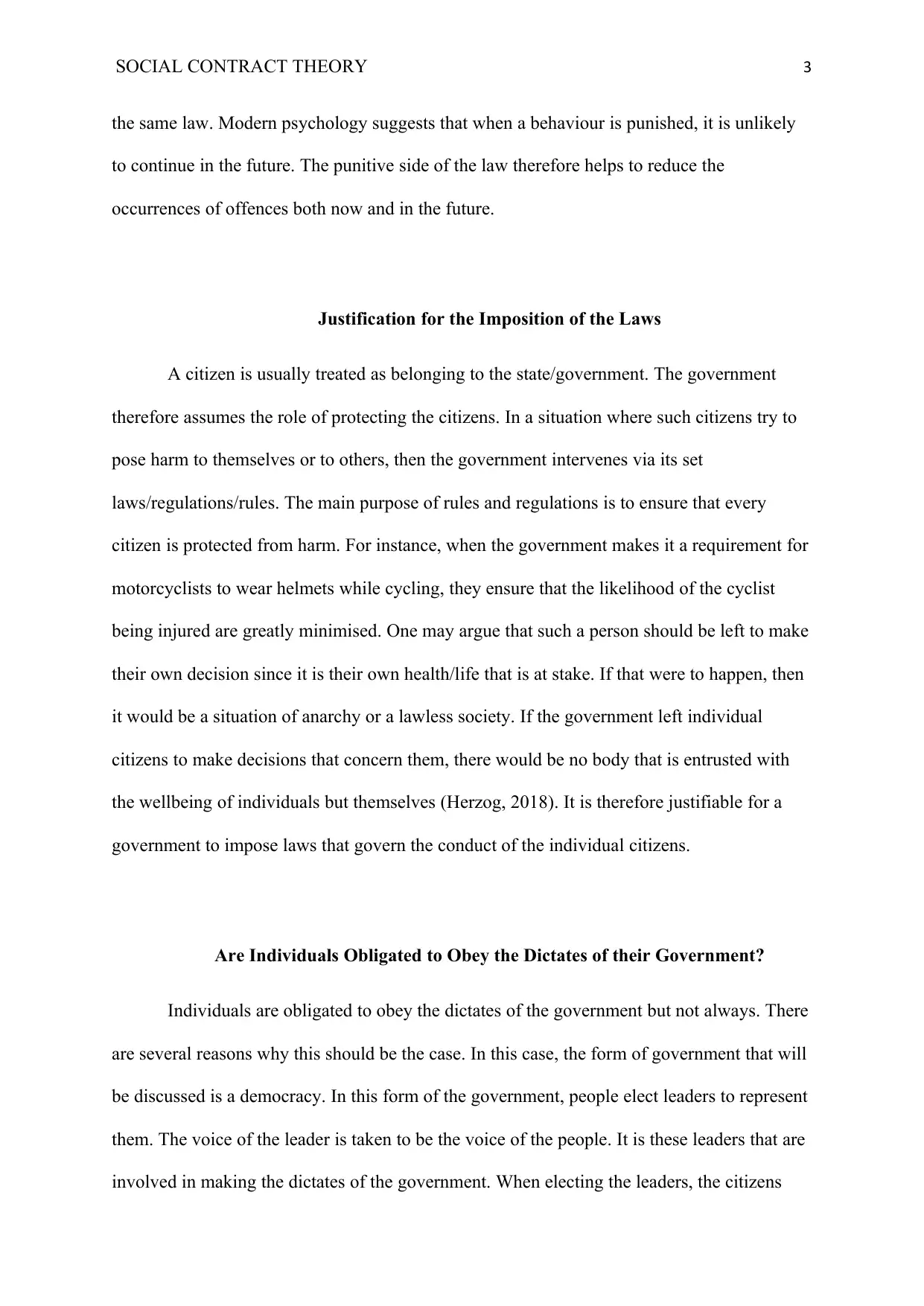
SOCIAL CONTRACT THEORY 3
the same law. Modern psychology suggests that when a behaviour is punished, it is unlikely
to continue in the future. The punitive side of the law therefore helps to reduce the
occurrences of offences both now and in the future.
Justification for the Imposition of the Laws
A citizen is usually treated as belonging to the state/government. The government
therefore assumes the role of protecting the citizens. In a situation where such citizens try to
pose harm to themselves or to others, then the government intervenes via its set
laws/regulations/rules. The main purpose of rules and regulations is to ensure that every
citizen is protected from harm. For instance, when the government makes it a requirement for
motorcyclists to wear helmets while cycling, they ensure that the likelihood of the cyclist
being injured are greatly minimised. One may argue that such a person should be left to make
their own decision since it is their own health/life that is at stake. If that were to happen, then
it would be a situation of anarchy or a lawless society. If the government left individual
citizens to make decisions that concern them, there would be no body that is entrusted with
the wellbeing of individuals but themselves (Herzog, 2018). It is therefore justifiable for a
government to impose laws that govern the conduct of the individual citizens.
Are Individuals Obligated to Obey the Dictates of their Government?
Individuals are obligated to obey the dictates of the government but not always. There
are several reasons why this should be the case. In this case, the form of government that will
be discussed is a democracy. In this form of the government, people elect leaders to represent
them. The voice of the leader is taken to be the voice of the people. It is these leaders that are
involved in making the dictates of the government. When electing the leaders, the citizens
the same law. Modern psychology suggests that when a behaviour is punished, it is unlikely
to continue in the future. The punitive side of the law therefore helps to reduce the
occurrences of offences both now and in the future.
Justification for the Imposition of the Laws
A citizen is usually treated as belonging to the state/government. The government
therefore assumes the role of protecting the citizens. In a situation where such citizens try to
pose harm to themselves or to others, then the government intervenes via its set
laws/regulations/rules. The main purpose of rules and regulations is to ensure that every
citizen is protected from harm. For instance, when the government makes it a requirement for
motorcyclists to wear helmets while cycling, they ensure that the likelihood of the cyclist
being injured are greatly minimised. One may argue that such a person should be left to make
their own decision since it is their own health/life that is at stake. If that were to happen, then
it would be a situation of anarchy or a lawless society. If the government left individual
citizens to make decisions that concern them, there would be no body that is entrusted with
the wellbeing of individuals but themselves (Herzog, 2018). It is therefore justifiable for a
government to impose laws that govern the conduct of the individual citizens.
Are Individuals Obligated to Obey the Dictates of their Government?
Individuals are obligated to obey the dictates of the government but not always. There
are several reasons why this should be the case. In this case, the form of government that will
be discussed is a democracy. In this form of the government, people elect leaders to represent
them. The voice of the leader is taken to be the voice of the people. It is these leaders that are
involved in making the dictates of the government. When electing the leaders, the citizens
⊘ This is a preview!⊘
Do you want full access?
Subscribe today to unlock all pages.

Trusted by 1+ million students worldwide
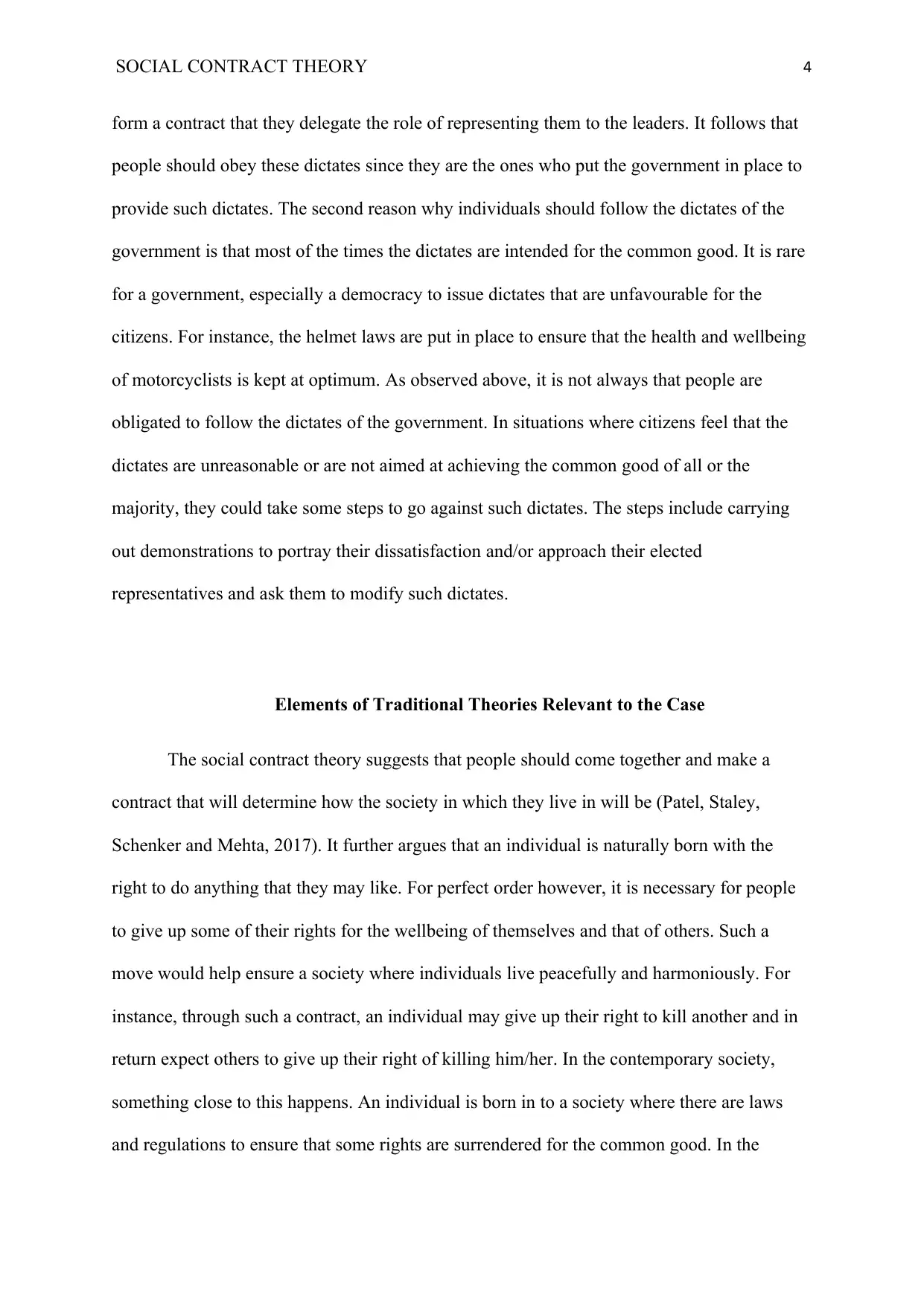
SOCIAL CONTRACT THEORY 4
form a contract that they delegate the role of representing them to the leaders. It follows that
people should obey these dictates since they are the ones who put the government in place to
provide such dictates. The second reason why individuals should follow the dictates of the
government is that most of the times the dictates are intended for the common good. It is rare
for a government, especially a democracy to issue dictates that are unfavourable for the
citizens. For instance, the helmet laws are put in place to ensure that the health and wellbeing
of motorcyclists is kept at optimum. As observed above, it is not always that people are
obligated to follow the dictates of the government. In situations where citizens feel that the
dictates are unreasonable or are not aimed at achieving the common good of all or the
majority, they could take some steps to go against such dictates. The steps include carrying
out demonstrations to portray their dissatisfaction and/or approach their elected
representatives and ask them to modify such dictates.
Elements of Traditional Theories Relevant to the Case
The social contract theory suggests that people should come together and make a
contract that will determine how the society in which they live in will be (Patel, Staley,
Schenker and Mehta, 2017). It further argues that an individual is naturally born with the
right to do anything that they may like. For perfect order however, it is necessary for people
to give up some of their rights for the wellbeing of themselves and that of others. Such a
move would help ensure a society where individuals live peacefully and harmoniously. For
instance, through such a contract, an individual may give up their right to kill another and in
return expect others to give up their right of killing him/her. In the contemporary society,
something close to this happens. An individual is born in to a society where there are laws
and regulations to ensure that some rights are surrendered for the common good. In the
form a contract that they delegate the role of representing them to the leaders. It follows that
people should obey these dictates since they are the ones who put the government in place to
provide such dictates. The second reason why individuals should follow the dictates of the
government is that most of the times the dictates are intended for the common good. It is rare
for a government, especially a democracy to issue dictates that are unfavourable for the
citizens. For instance, the helmet laws are put in place to ensure that the health and wellbeing
of motorcyclists is kept at optimum. As observed above, it is not always that people are
obligated to follow the dictates of the government. In situations where citizens feel that the
dictates are unreasonable or are not aimed at achieving the common good of all or the
majority, they could take some steps to go against such dictates. The steps include carrying
out demonstrations to portray their dissatisfaction and/or approach their elected
representatives and ask them to modify such dictates.
Elements of Traditional Theories Relevant to the Case
The social contract theory suggests that people should come together and make a
contract that will determine how the society in which they live in will be (Patel, Staley,
Schenker and Mehta, 2017). It further argues that an individual is naturally born with the
right to do anything that they may like. For perfect order however, it is necessary for people
to give up some of their rights for the wellbeing of themselves and that of others. Such a
move would help ensure a society where individuals live peacefully and harmoniously. For
instance, through such a contract, an individual may give up their right to kill another and in
return expect others to give up their right of killing him/her. In the contemporary society,
something close to this happens. An individual is born in to a society where there are laws
and regulations to ensure that some rights are surrendered for the common good. In the
Paraphrase This Document
Need a fresh take? Get an instant paraphrase of this document with our AI Paraphraser
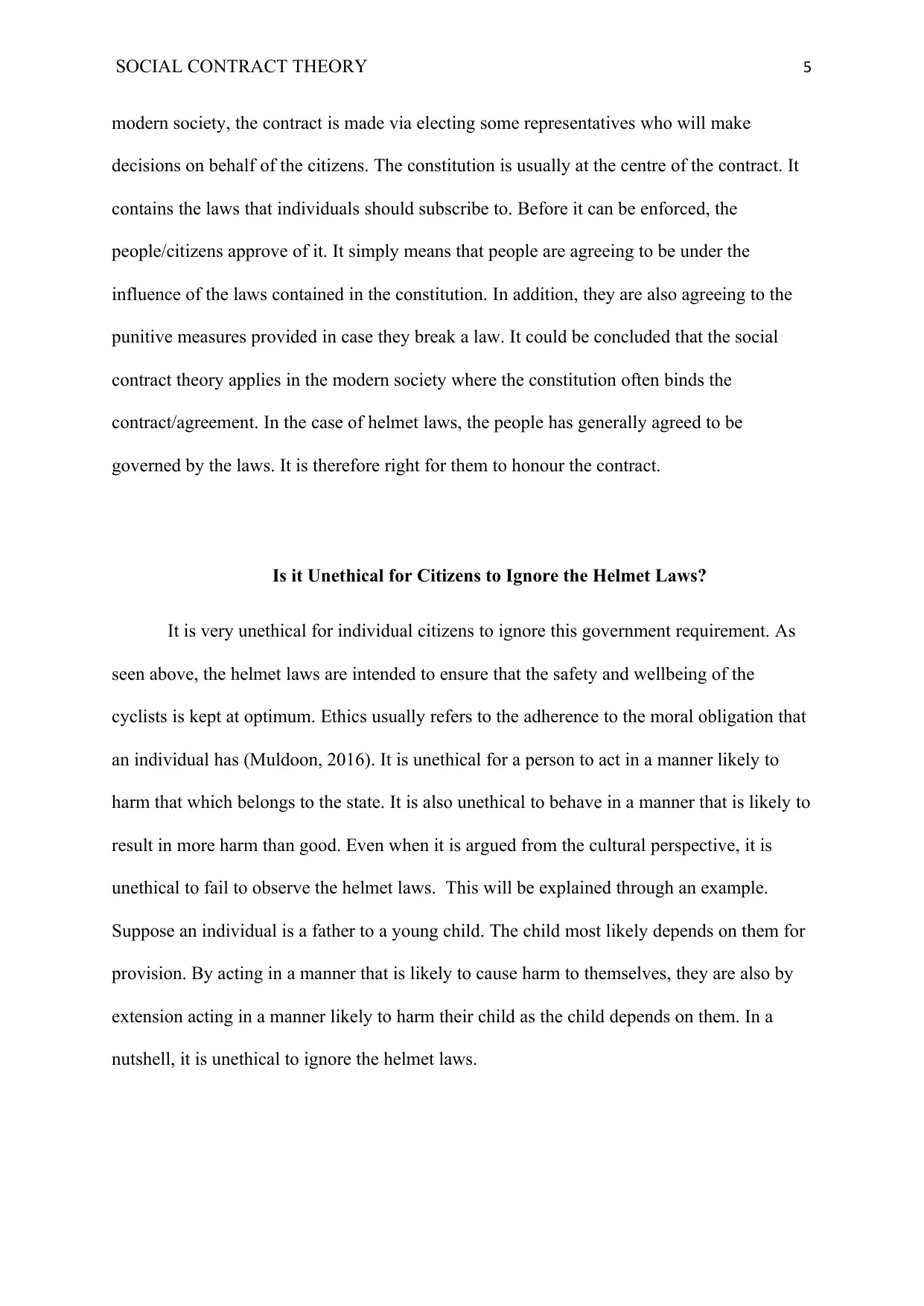
SOCIAL CONTRACT THEORY 5
modern society, the contract is made via electing some representatives who will make
decisions on behalf of the citizens. The constitution is usually at the centre of the contract. It
contains the laws that individuals should subscribe to. Before it can be enforced, the
people/citizens approve of it. It simply means that people are agreeing to be under the
influence of the laws contained in the constitution. In addition, they are also agreeing to the
punitive measures provided in case they break a law. It could be concluded that the social
contract theory applies in the modern society where the constitution often binds the
contract/agreement. In the case of helmet laws, the people has generally agreed to be
governed by the laws. It is therefore right for them to honour the contract.
Is it Unethical for Citizens to Ignore the Helmet Laws?
It is very unethical for individual citizens to ignore this government requirement. As
seen above, the helmet laws are intended to ensure that the safety and wellbeing of the
cyclists is kept at optimum. Ethics usually refers to the adherence to the moral obligation that
an individual has (Muldoon, 2016). It is unethical for a person to act in a manner likely to
harm that which belongs to the state. It is also unethical to behave in a manner that is likely to
result in more harm than good. Even when it is argued from the cultural perspective, it is
unethical to fail to observe the helmet laws. This will be explained through an example.
Suppose an individual is a father to a young child. The child most likely depends on them for
provision. By acting in a manner that is likely to cause harm to themselves, they are also by
extension acting in a manner likely to harm their child as the child depends on them. In a
nutshell, it is unethical to ignore the helmet laws.
modern society, the contract is made via electing some representatives who will make
decisions on behalf of the citizens. The constitution is usually at the centre of the contract. It
contains the laws that individuals should subscribe to. Before it can be enforced, the
people/citizens approve of it. It simply means that people are agreeing to be under the
influence of the laws contained in the constitution. In addition, they are also agreeing to the
punitive measures provided in case they break a law. It could be concluded that the social
contract theory applies in the modern society where the constitution often binds the
contract/agreement. In the case of helmet laws, the people has generally agreed to be
governed by the laws. It is therefore right for them to honour the contract.
Is it Unethical for Citizens to Ignore the Helmet Laws?
It is very unethical for individual citizens to ignore this government requirement. As
seen above, the helmet laws are intended to ensure that the safety and wellbeing of the
cyclists is kept at optimum. Ethics usually refers to the adherence to the moral obligation that
an individual has (Muldoon, 2016). It is unethical for a person to act in a manner likely to
harm that which belongs to the state. It is also unethical to behave in a manner that is likely to
result in more harm than good. Even when it is argued from the cultural perspective, it is
unethical to fail to observe the helmet laws. This will be explained through an example.
Suppose an individual is a father to a young child. The child most likely depends on them for
provision. By acting in a manner that is likely to cause harm to themselves, they are also by
extension acting in a manner likely to harm their child as the child depends on them. In a
nutshell, it is unethical to ignore the helmet laws.
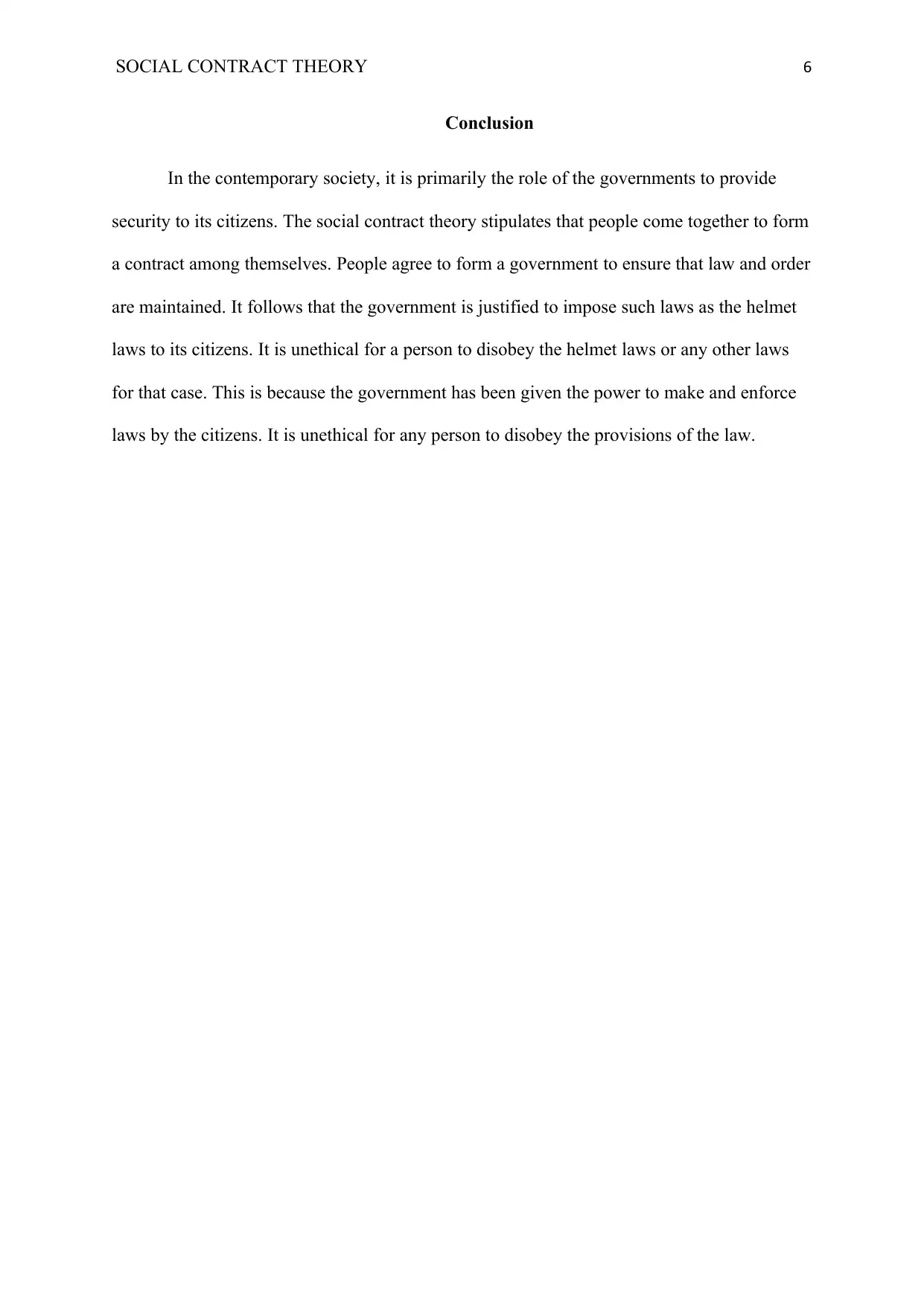
SOCIAL CONTRACT THEORY 6
Conclusion
In the contemporary society, it is primarily the role of the governments to provide
security to its citizens. The social contract theory stipulates that people come together to form
a contract among themselves. People agree to form a government to ensure that law and order
are maintained. It follows that the government is justified to impose such laws as the helmet
laws to its citizens. It is unethical for a person to disobey the helmet laws or any other laws
for that case. This is because the government has been given the power to make and enforce
laws by the citizens. It is unethical for any person to disobey the provisions of the law.
Conclusion
In the contemporary society, it is primarily the role of the governments to provide
security to its citizens. The social contract theory stipulates that people come together to form
a contract among themselves. People agree to form a government to ensure that law and order
are maintained. It follows that the government is justified to impose such laws as the helmet
laws to its citizens. It is unethical for a person to disobey the helmet laws or any other laws
for that case. This is because the government has been given the power to make and enforce
laws by the citizens. It is unethical for any person to disobey the provisions of the law.
⊘ This is a preview!⊘
Do you want full access?
Subscribe today to unlock all pages.

Trusted by 1+ million students worldwide
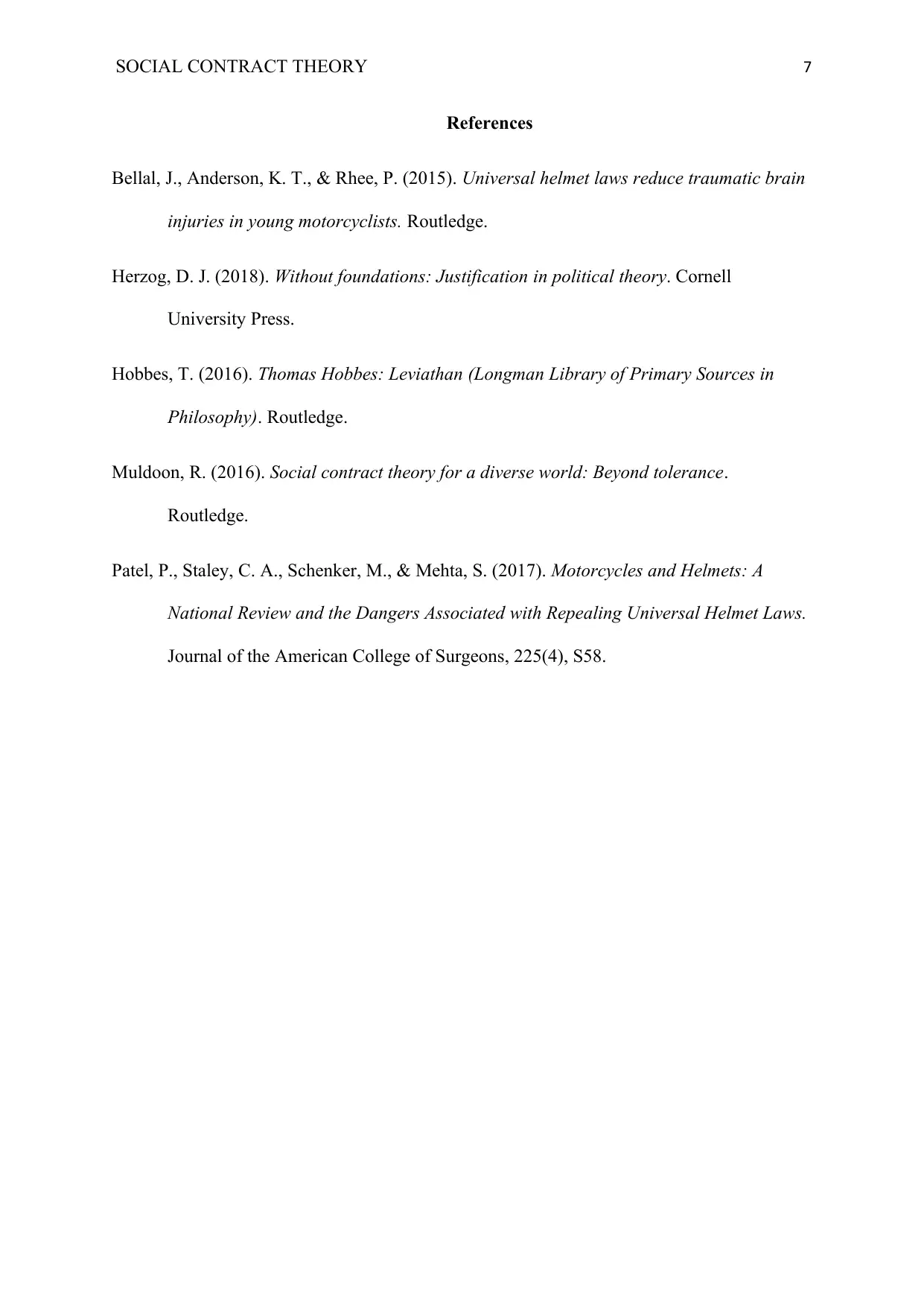
SOCIAL CONTRACT THEORY 7
References
Bellal, J., Anderson, K. T., & Rhee, P. (2015). Universal helmet laws reduce traumatic brain
injuries in young motorcyclists. Routledge.
Herzog, D. J. (2018). Without foundations: Justification in political theory. Cornell
University Press.
Hobbes, T. (2016). Thomas Hobbes: Leviathan (Longman Library of Primary Sources in
Philosophy). Routledge.
Muldoon, R. (2016). Social contract theory for a diverse world: Beyond tolerance.
Routledge.
Patel, P., Staley, C. A., Schenker, M., & Mehta, S. (2017). Motorcycles and Helmets: A
National Review and the Dangers Associated with Repealing Universal Helmet Laws.
Journal of the American College of Surgeons, 225(4), S58.
References
Bellal, J., Anderson, K. T., & Rhee, P. (2015). Universal helmet laws reduce traumatic brain
injuries in young motorcyclists. Routledge.
Herzog, D. J. (2018). Without foundations: Justification in political theory. Cornell
University Press.
Hobbes, T. (2016). Thomas Hobbes: Leviathan (Longman Library of Primary Sources in
Philosophy). Routledge.
Muldoon, R. (2016). Social contract theory for a diverse world: Beyond tolerance.
Routledge.
Patel, P., Staley, C. A., Schenker, M., & Mehta, S. (2017). Motorcycles and Helmets: A
National Review and the Dangers Associated with Repealing Universal Helmet Laws.
Journal of the American College of Surgeons, 225(4), S58.
1 out of 7
Related Documents
Your All-in-One AI-Powered Toolkit for Academic Success.
+13062052269
info@desklib.com
Available 24*7 on WhatsApp / Email
![[object Object]](/_next/static/media/star-bottom.7253800d.svg)
Unlock your academic potential
Copyright © 2020–2026 A2Z Services. All Rights Reserved. Developed and managed by ZUCOL.





